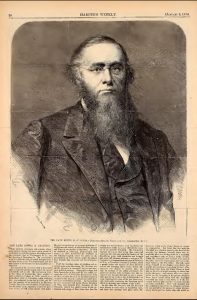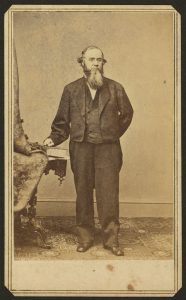Edwin M. Stanton, Secretary of War during most of the Abraham Lincoln and Andrew Johnson administrations, died on December 24, 1869. Funeral services were held 150 years ago today in Washington, D.C. Harper’s Weekly eulogized him in its January 8, 1870 issue:
EDWIN M. STANTON
Since he left the War Department the health of Mr. STANTON has been so uncertain that nobody could have been very much surprised by the news of his death. But there was no patriotic household in the land whose Christmas was not saddened by it, and which did not feel the singular felicity of the President’s words in announcing the event – words that should be carved upon Mr. STANTON’S tomb. “He was unceasing in his labors; earnest and fearless in the assumption of responsibilities necessary to his country’s success; respected by all good men, and feared by wrong-doers.” A nobler epitaph for a public man could not be written, nor truer words spoken of Mr. STANTON. So true are they that there was not an honorable American who did not feel that the highest praise of the dead Secretary was the vulgar and futile abuse of the New York World, poured out unconsciously on his corpse. Had Mr. STANTON devoted his great powers and tireless energy to perpetuating slavery and destroying the government, the World would have saluted him as a constitutional hero and a Christian gentleman.
Mr. STANTON’S services to the country during the war, like Mr. LINCOLN’S, like Governor ANDREW’S, like those of all the chief men of that time, are incalculable. It can never be known, indeed, that there were not others who would have been as indomitable and efficient in the most trying and laborious of positions; but it will always be historical that his administration of his office was an inspiration to the whole country, and that every heart was stronger and every hand surer for the consciousness of the unquenchable energy at the centre [sic]. The worth of one such intelligent will at such a time is immeasurable. Happily among the most faithful and eminent of the soldiers and civilians of that tremendous hour the country cannot divide its gratitude. Its love and respect unite them. What Mr. LINCOLN thought of Mr. STANTON is well known. How General GRANT trusted and honored him the country has seen. They were worthy of each other, and the latest generation of faithful Americans will associate them in hallowed remembrance.
To the salvation of the Government Mr. STANTON gave every thing: talent, time, health, fortune, and at last life itself. He spared neither himself or others. Controlling millions of men and enormous sums of money, not a thought nor an act, however peremptory, was sullied with a suspicion of selfishness. In so vast and incessant an activity injustice was inevitable, but it was not culpable. Such men in such times are tested by purity of motive and by beneficence of results. Nor will it ever be forgotten that the man who, in a post like that of Mr. STANTON, is “earnest and fearless in the assumption of responsibilities necessary for his country’s success,” inevitably outruns a limited sympathy, and appeals to the general reason. He is in too close contact with prejudices and passions of every kind to be invested with the least personal glamour. His immediate career has, therefore, a certain undue austerity of aspect which time will touch tenderly and soften into truth.
Mr. STANTON was greatest upon great occasions. With personal urbanity and magnetism he would have been a great leader of men. In the crucial hour of our history, when the President was assassinated by the spirit that sought to turn this country into a slave-pen, the spirit that jeered at LINCOLN as a gorilla, and at GRANT as a butcher, and that now spits at STANTON as a bloated blackguard, the Secretary steadied the heart of the people, and showed us all that our Government, when intrusted [sic] to such men – and only then – is superior to every adverse shock. Besides the soldiers who died upon the field, the three most illustrious victims of the war are LINCOLN, ANDREW, and STANTON. They will all rank among the most famous and honored Americans. ANDREW, STANTON, LINCOLN – the conviction, the will, the benignity of the better America. In their characters we read the prophecy of our career. By their deaths let us be bound even more solemnly to fulfill it.
President Grant nominated Edwin McMasters Stanton for Supreme Court Justice on December 19, 1869. The Senate quickly confirmed the appointment.


